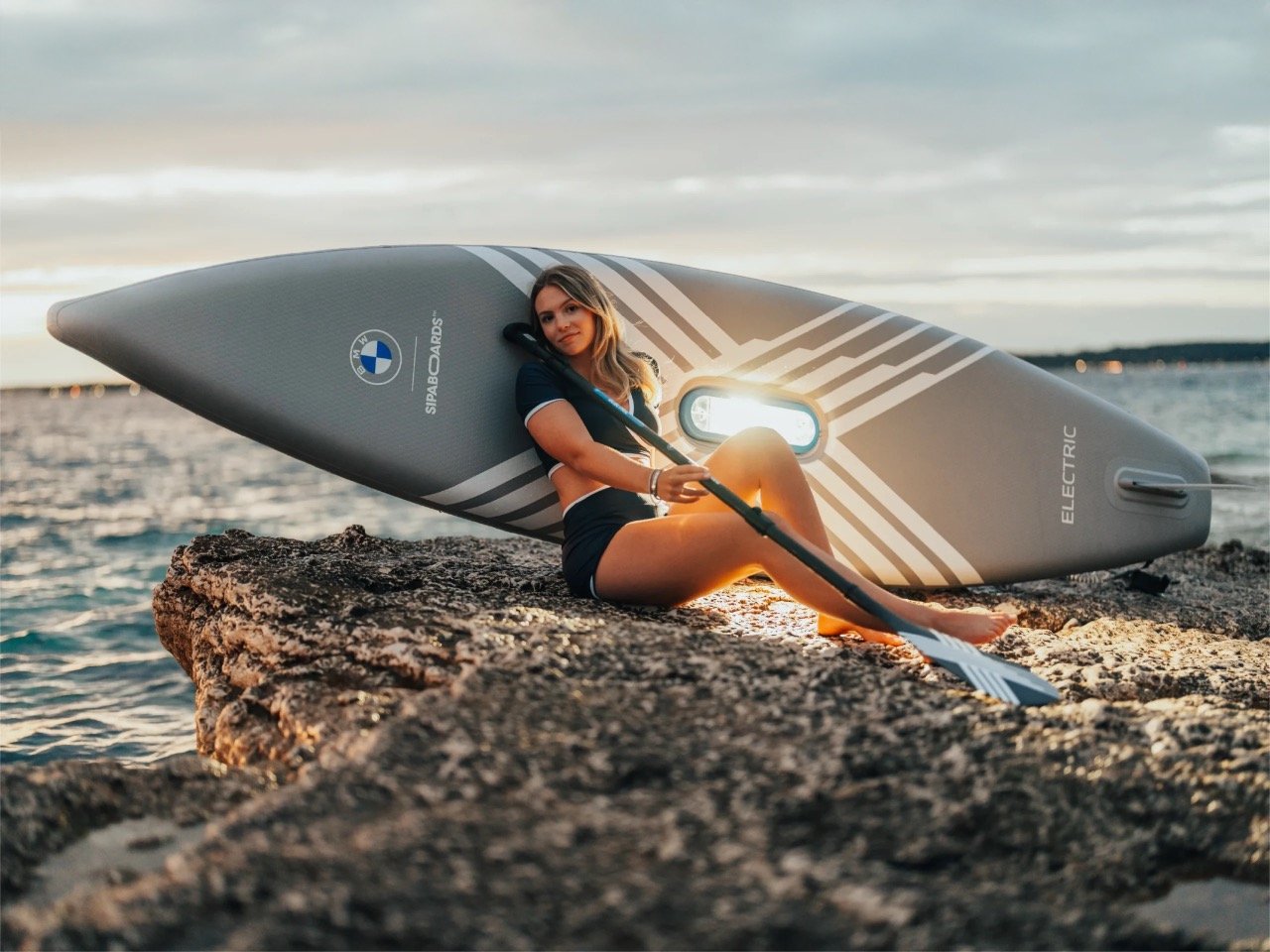A BMW paddleboard was absolutely not on my 2025 bingo card, yet here we are. The German automaker, apparently tired of limiting its electrification ambitions to asphalt, has partnered with Estonian watersports company SipaBoards to launch the BMW x SipaBoards e-SUP, an electric stand-up paddleboard that costs €3,990 (about $4,650) and comes with all the premium trappings you’d expect from a brand that charges extra for heated seats. The board was just unveiled at BMW Welt in Munich alongside the new iX3, because apparently nothing says “electric vehicle future” quite like a floating recreation device with a waterjet motor.
This might seem like a bizarre tangent for a car company, but BMW has always been obsessed with what it calls “sheer driving pleasure,” and I suppose when you run out of road, you start eyeing the water. The e-SUP features a 300-watt integrated motor that uses silent waterjet technology, which SipaBoards claims is 15% more powerful than previous versions while being quieter than anything else in the category. The board ships with two 90Wh battery modules good for 3.5 hours of assisted paddling, with larger 180Wh modules coming in 2026 that will double runtime to around 7 hours. You control the motor via a paddle-mounted remote that’s styled after BMW’s Neue Klasse design language, letting you throttle up without fumbling around or losing your balance.
Designers: BMW & Sipaboards
The e-SUP self-inflates, eliminating the tedious pump ritual that makes inflatable SUPs such a pain to deploy. Once inflated, the board measures in at a touring-friendly length (looks like their 12-foot model based on the “120” marking visible in the photos), with that signature pointed nose and enough deck space for gear mounting via the modular SipaMount system. That modularity matters because it means you can retrofit accessories and future upgrades without replacing the entire board, which is exactly the kind of longevity thinking that makes expensive gear purchases easier to justify. The design itself leans heavily into geometric patterns and muted blues and greys, with angular lines that echo the faceted, almost origami-like surfaces BMW has been experimenting with on concept vehicles.
Even though it does sound absurd on paper, the e-SUP really does align with BMW’s core identity. The German marque has always marketed itself around precision engineering, driver assist technology, and a certain aspirational lifestyle appeal. An app-connected paddleboard with route planning, performance tracking, and electric assist fits that template surprisingly well. You get the same obsessive attention to user experience: intuitive controls, connectivity features, modular upgradeability, and that unmistakable premium aesthetic. The safety angle is real too. Every year, paddleboarders get swept out by currents or wind, and having an electric motor as backup could genuinely prevent rescues or worse. It’s the same philosophy behind stability control in cars, just applied to a completely different environment.
The $4,650 pricing will make purists scoff, and they have a point. You can get a solid non-electric inflatable SUP for a quarter of the cost, and serious paddlers might balk at the weight penalty of integrated motors and batteries. But BMW has never competed on value. They compete on aspiration, refinement, and that intangible sense that you’re using something designed with obsessive care. The e-SUP succeeds at projecting that, from the premium carry bag to the sleek industrial design. Whether it finds an audience beyond BMW superfans and gadget-obsessed water sports enthusiasts remains to be seen, but as a first foray into electric watercraft, it’s competent, surprisingly coherent, and way more thought-through than I expected when I first heard “BMW paddleboard.” Sometimes brand extensions are desperate cash grabs. This one actually makes a weird kind of sense.
The post The BMW Electric Paddleboard Costs $4,650 and Has More Tech Than Your First Car first appeared on Yanko Design.

